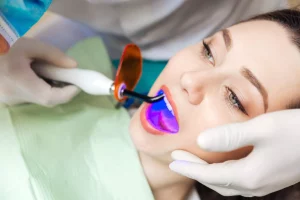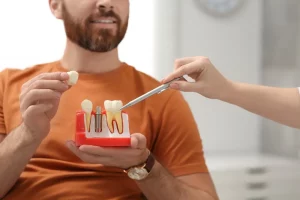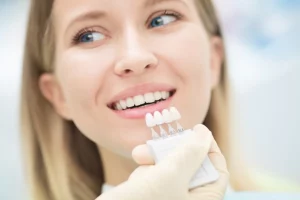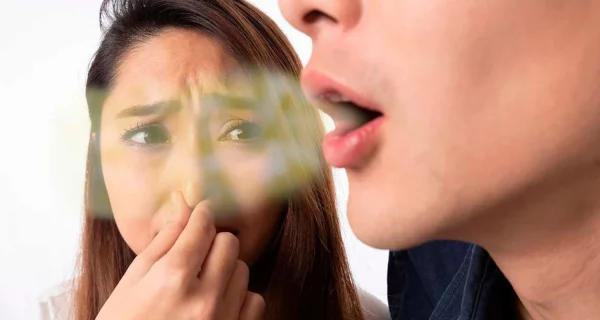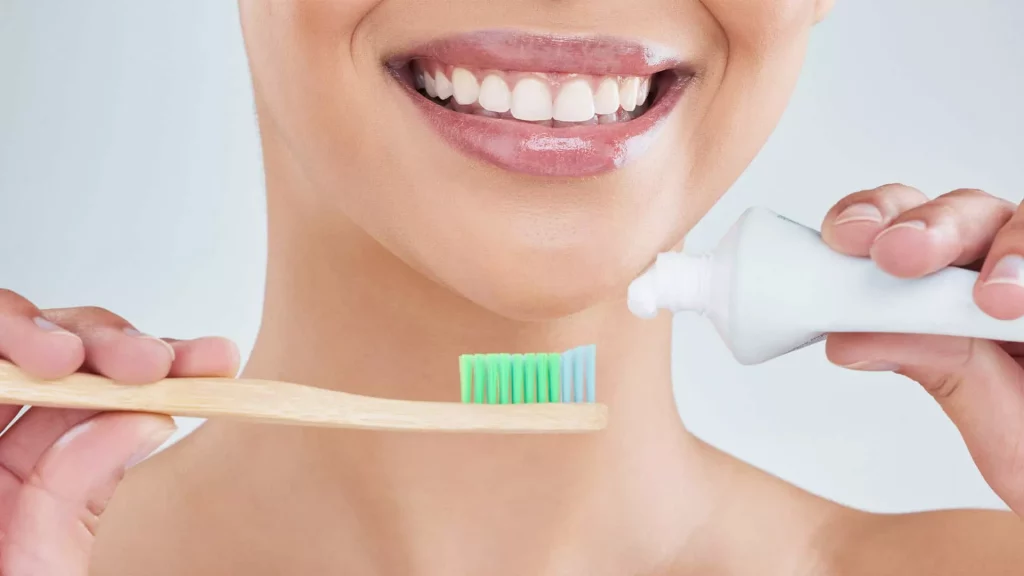Last Updated on: 12th August 2025, 12:26 pm
Dental pain is the main reason for a dental consultation: A study carried out in France in 2015 showed that 76% of the people who sought care in a dental emergency department came for pain. Many patients describe toothache as the worst pain they have ever felt. So let’s dive into why teeth hurt.
How does Dental Pain work?

Teeth have a hard external structure (enamel and dentin) that protects the internal soft tissue, called dental pulp, which is made up of nerves and small blood vessels. In turn, each tooth has two parts: the one visible in the mouth responsible for chewing (crown) and the one that is not visible because it is submerged within the bone and gums (root).
The teeth and the structures that surround them have nerve endings such that when any type of aggression, damage, or disease occurs, they send signals to the brain as an alert and defense mechanism that indicate that something is wrong. Thus, depending upon its origin, dental pain can be:
- In the pulp, coming from the nerve inside the tooth.
- Periodontal: when it comes from the supporting tissues of the tooth, such as the bone and gums.
Sometimes, it is perceived only as an increased sensitivity to certain stimuli, but in advanced cases, spontaneous and intense tooth pain can also occur and is felt all over the face or head (radiated). It could interrupt sleep.
Possible Reasons Why Do Teeth Hurt?
There are many reasons why the teeth and the structures that support them may generate pain:
1. Extreme cold or heat
The dental pulp is sensitive to changes in temperature. Very cold or very hot foods can cause sensitivity, which under normal conditions should disappear when the stimulus is removed.
2. Gum recession
The roots of the teeth are usually covered by gum tissue. Sometimes, brushing the teeth horizontally can cause the gums to recede and the roots to be exposed to air and temperature changes, causing pain.
3. Erosion of dental enamel
Erosion is wear on the surface of the teeth, which occurs due to contact with acid substances, thereby thinning the hard layer of the tooth and leaving the pulp more exposed to the environment. It usually happens in people who consume too many citrus fruits, those who suffer from gastric reflux, or pregnant women who vomit frequently.
For this reason, it is advisable to brush your teeth right after vomiting, to prevent gastric juices (which are highly acidic) from eroding the tooth enamel and to reduce the consumption of highly acidic foods and drinks.
4. Recent dental procedures
These are usually temporary discomforts that can be generated after:
- Deep cleaning: By removing food stuck to the surface of the tooth (plaque), the pulp must get used to exposure to cold and heat again.
- Teeth whitening: Chemicals are used that can be too aggressive for the nerves. The dentist will generally offer some recommendations to decrease sensitivity.
- Restorations (shims): When too deep, it can take a week or two for the nerve to get used to the new restoration. If this does not happen, further treatment may be required.
5. Dislodgement of restorations (fittings or cures)
When dental restorations fall out, the wall that covers the dental pulp becomes thinner, leaving the latter more exposed to contact with food.
6. Deep caries
Caries are the formation of cavities due to the presence of bacteria that damages and softens the tooth. Caries are an attack on the dental pulp, which if not resolved in time can become very deep, generating very intense pain and even permanent nerve damage.
7. Dental fractures
These can directly or indirectly expose the nerve of the tooth.
8. Occlusal trauma
The damage occurs to the tissues that support the tooth when they receive too much force when chewing. It can happen when teeth are in a bad position when there is a lot of chewing on one side of the mouth, or when patients clench or grind their teeth, a condition known as bruxism. If it is not solved in time, it could also affect the dental pulp.
9. Infections
They occur due to cavities not being treated in time or due to gum disease as a consequence of poor hygiene. There is usually severe inflammation, abscesses (accumulations of pus), and sometimes mobility in the teeth, causing a lot of pain.
10. Wisdom teeth
Wisdom teeth come in between the ages of 16 and 25 and can emerge in a bad position, engendering pain. They may also press on a nerve or cause damage to nearby teeth.
11. Sinusitis
Some teeth have roots so long that they reach into the maxillary sinuses (air-filled cavities next to the nose). When there is inflammation of these structures, pain can be felt in the teeth.
12. Nerve damage
This is known as “neuropathy.” It can be caused by diseases such as diabetes or nerve problems, resulting in intense pain even when the teeth are healthy.
13. Tumors or cysts
In some cases, when the teeth and gums are healthy to the naked eye, the pain may be generated by a cyst or tumor that presses on the nerves inside the jaws, giving rise to very severe pain.
14. Heart disease
Some people can feel severe pain in their jaws when they are having a heart attack.
Is it Advisable to Take Non-prescription Medications for Dental Pain?

Although medicines can temporarily alleviate the discomfort, no drug can solve the underlying problem by itself; it only hides it. The only way to efficiently and permanently relieve dental pain is to schedule a consultation with a dentist, who after a thorough examination, will determine the cause and solve the problem. The dentist could prescribe medication, but they only work as a support to the treatment.
It is not advisable to take medications without a prescription from a health professional because side effects like allergies and unexpected interactions could occur when combining pain relievers with other medications. In addition, the pain can be camouflaged while the real problem continues to progress without being treated.
When to Visit a Fentist?

When severe dental pain occurs, it is not advisable to wait for it to resolve itself since in many cases, the pain can disappear momentarily and reappear sometime later, becoming more intense and difficult to manage. In the case of dental pain or sensitivity, the best option is to visit a dentist; although sometimes this discomfort does not represent a serious problem, it can indicate cavities, infections, or oral diseases that may be damaging the teeth or the tissues that support them.
In addition, when the nerve inside the tooth is constantly exposed to a painful stimulus and the problem is not quickly solved, it can become inflamed and irreversibly damaged, causing even more intense pain and an infection so serious that in extreme cases, it can be lethal.
Conclusion
Dental pain is a sign that something is not working properly and, therefore, it functions as a defense mechanism. The reason why teeth hurt may be caused by multiple factors, and depending upon its origin, the treatment to alleviate it varies. Typically, the earlier dental problems are detected, the easier and less costly they are to fix. Whenever there is pain or dental sensitivity, consult a dentist to find the cause and resolve it promptly.
Likewise, scheduling a dental checkup once every six months is a good way to detect dental abnormalities before they cause pain that could become unbearable.
Contact us
If you have any questions about this or other topics, you can contact us at Channel Islands Family Dental as well as our page on Facebook. We look forward to your visit and we will make a timely diagnosis. Our dentists in Oxnard, Santa Paula, Ventura, Newbury Park, and Port Hueneme will be able to guide you toward the best treatment to take care of your health and give you back your best smile.
Bibliography
- Tooth Sensitivity: What Treatments Are Available? (2021, December 7). Mayo Clinic.https://www.mayoclinic.org/es-es/healthy-lifestyle/adult-health/expert-answers/sensitive-teeth/faq-20057854
- Toothache: Causes, Symptoms, Treatment & Prevention. (nd). Cleveland Clinic. https://my.clevelandclinic.org/health/diseases/10957-toothache
- Longridge, NN, & Youngson, CC (2019). Dental Pain: Dentine Sensitivity, Hypersensitivity, and Cracked Tooth Syndrome. Primary dental journal, 8(1), 44–51. https://doi.org/10.1177/205016841900800101
- Villines, Z. (2020, March 23). What can cause all the teeth to hurt suddenly? https://www.medicalnewstoday.com/articles/all-my-teeth-hurt-suddenly
- Renton T. (2020). Tooth-Related Pain or Not? Headache, 60(1), 235–246. https://doi.org/10.1111/head.13689
- Shueb, SS, Boyer, HC, & Nixdorf, DR (2016). Nonodontogenic “tooth pain” of nose and sinus origin. Journal of the American Dental Association (1939), 147(6), 457–459. https://jada.ada.org/article/S0002-8177(15)01137-X/abstract







